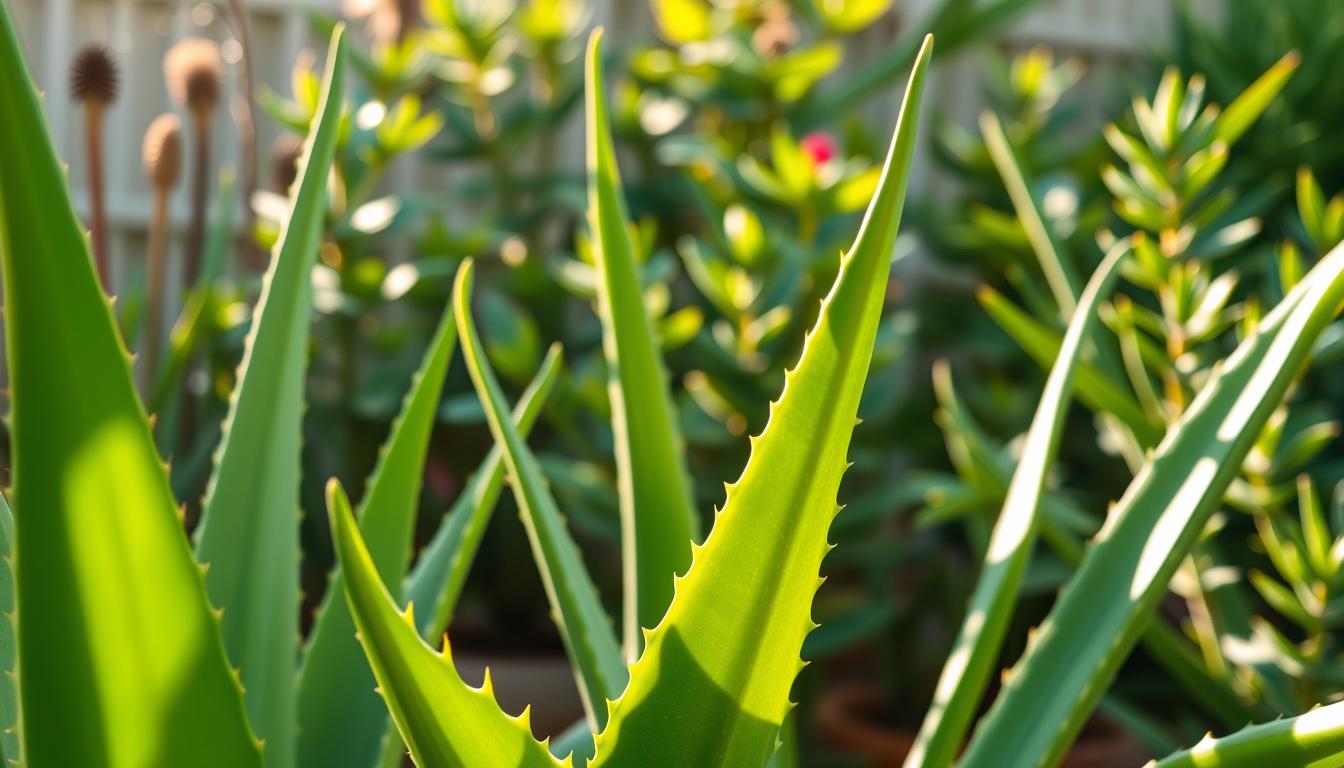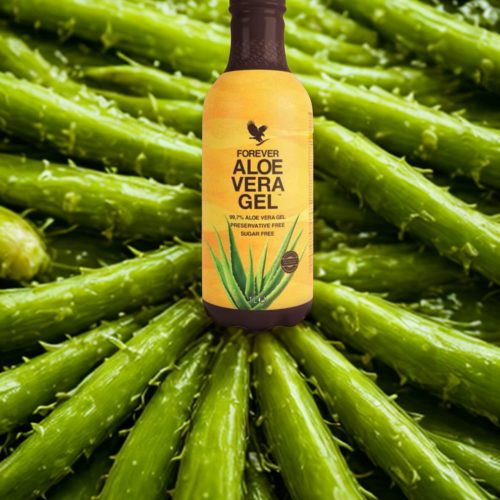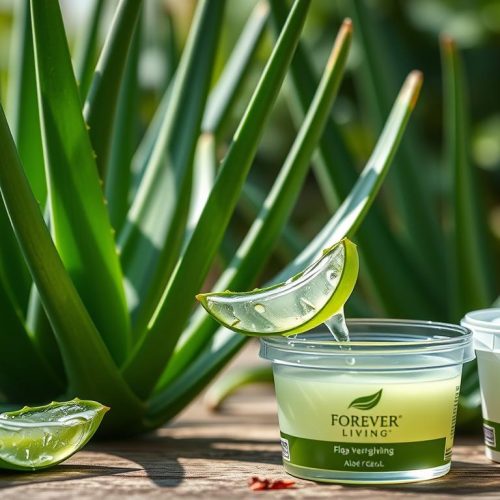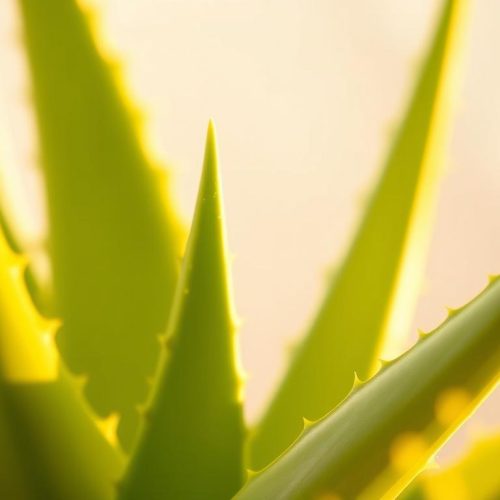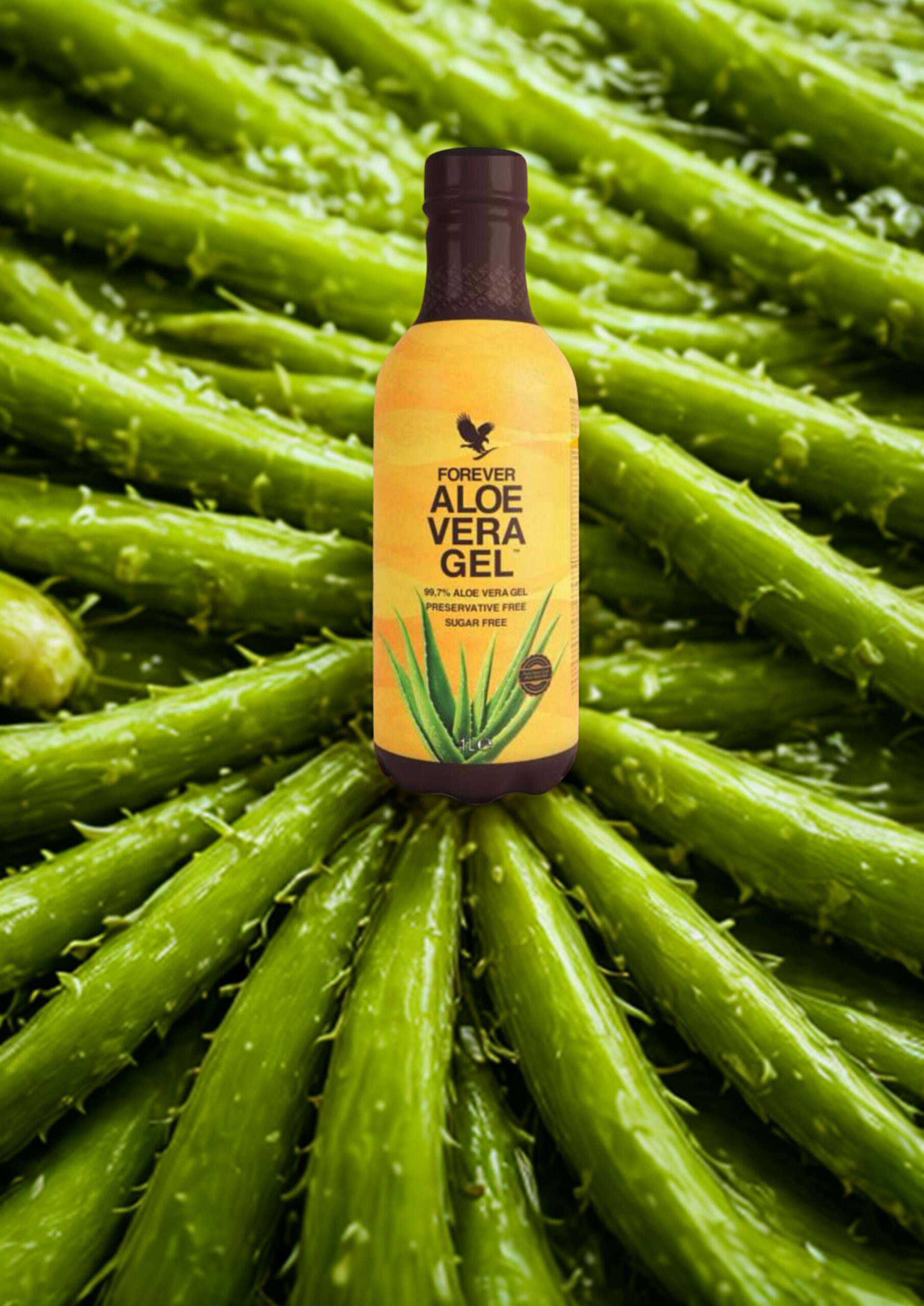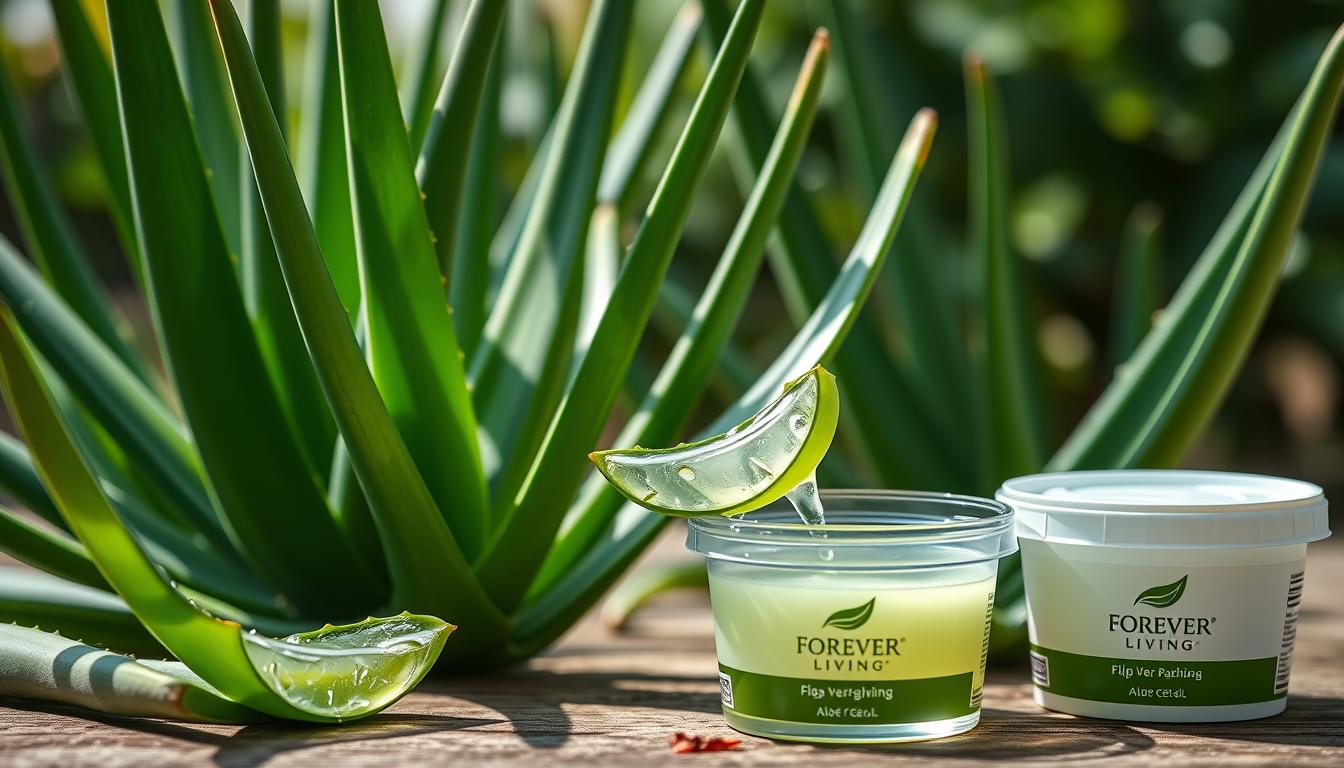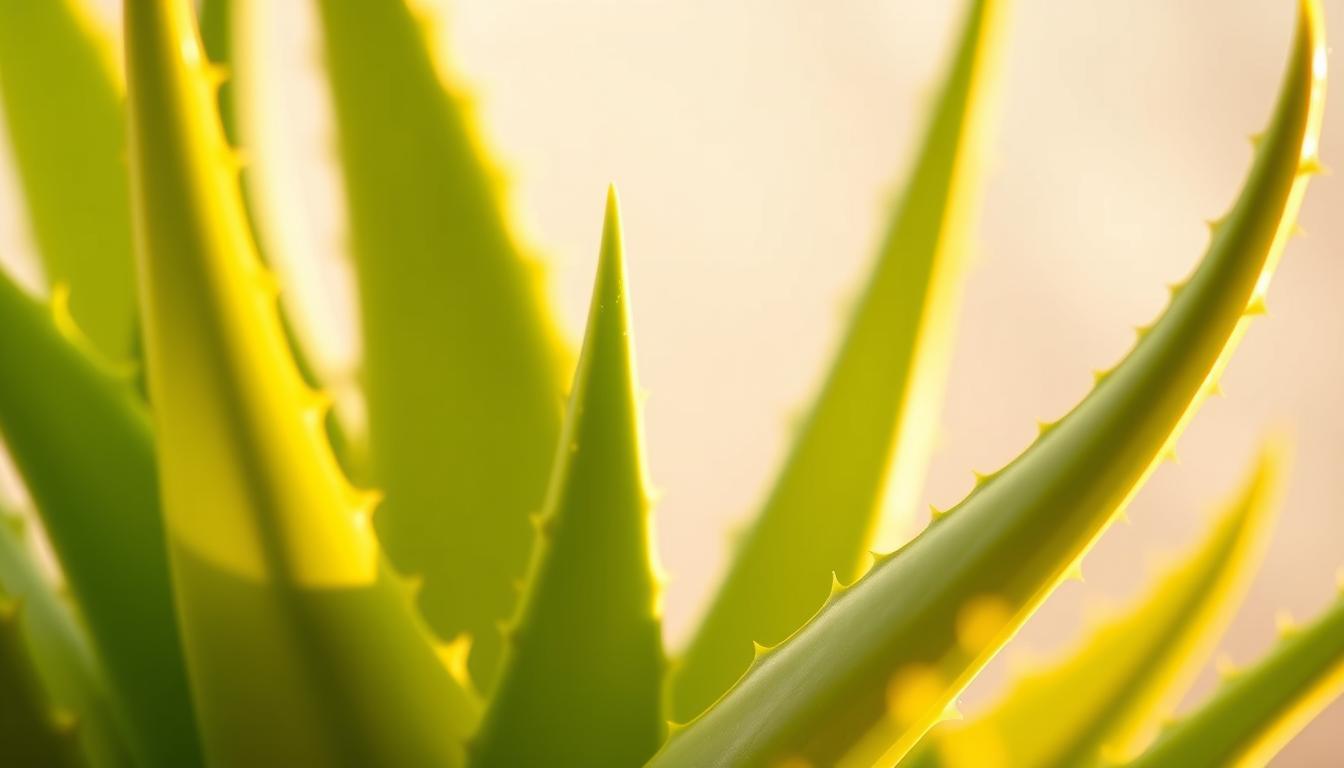The beauty industry is undergoing a significant transformation, driven by consumers’ increasing demand for sustainable and eco-friendly products. Aloe vera, with its numerous natural benefits and low environmental footprint, is at the forefront of this shift. Did you know that aloe vera requires minimal water to cultivate, making it an ideal crop for sustainable farming practices?
Aloe vera’s popularity in the beauty industry is not just due to its moisturizing and soothing properties but also its sustainable nature. As consumers become more environmentally conscious, the demand for products that are both effective and eco-friendly is on the rise.
- Nature's Green Gift: Discovering Aloe Vera
- The Eco-Friendly Power of Aloe Vera Explained
- Why Aloe Vera Wins the Sustainability Race
- Farming Aloe the Earth-Friendly Way
- People-Powered Aloe: Ethical Sourcing Stories
- Beautiful Planet: Eco-Friendly Aloe Beauty Products
- DIY Green Beauty: Make Your Own Aloe Products
- Aloe Beyond the Bathroom: Surprising Eco-Applications
- Green Showdown: Aloe vs. Synthetic Ingredients
- Trust Symbols: Certifications for Genuine Eco-Aloe
- Growing Communities Through Sustainable Aloe
- Conclusion: Embracing Aloe for a Greener Tomorrow
- FAQ
- What makes aloe vera a sustainable ingredient in beauty products?
- How does aloe vera contribute to reducing environmental impact?
- What are the benefits of using organic aloe vera skincare products?
- How can I ensure that the aloe vera products I buy are eco-friendly?
- Can I grow my own aloe vera for personal use?
- What are some eco-friendly ways to use aloe vera beyond skincare?
- How does aloe vera compare to synthetic ingredients in terms of environmental impact?
- What is the role of fair-trade cooperatives in promoting sustainable aloe vera farming?
- How can sustainable aloe vera farming positively impact local communities?
- Nature's Green Gift: Discovering Aloe Vera
- The Eco-Friendly Power of Aloe Vera Explained
- Why Aloe Vera Wins the Sustainability Race
- Farming Aloe the Earth-Friendly Way
- People-Powered Aloe: Ethical Sourcing Stories
- Beautiful Planet: Eco-Friendly Aloe Beauty Products
- DIY Green Beauty: Make Your Own Aloe Products
- Aloe Beyond the Bathroom: Surprising Eco-Applications
- Green Showdown: Aloe vs. Synthetic Ingredients
- Trust Symbols: Certifications for Genuine Eco-Aloe
- Growing Communities Through Sustainable Aloe
- Conclusion: Embracing Aloe for a Greener Tomorrow
- FAQ
- What makes aloe vera a sustainable ingredient in beauty products?
- How does aloe vera contribute to reducing environmental impact?
- What are the benefits of using organic aloe vera skincare products?
- How can I ensure that the aloe vera products I buy are eco-friendly?
- Can I grow my own aloe vera for personal use?
- What are some eco-friendly ways to use aloe vera beyond skincare?
- How does aloe vera compare to synthetic ingredients in terms of environmental impact?
- What is the role of fair-trade cooperatives in promoting sustainable aloe vera farming?
- How can sustainable aloe vera farming positively impact local communities?
Key Takeaways
- Aloe vera is a sustainable crop that requires minimal water for cultivation.
- The demand for eco-friendly beauty products is driving the growth of aloe vera in the cosmetics industry.
- Aloe vera’s natural benefits make it an ideal ingredient for sustainable beauty products.
- Consumers are increasingly prioritizing environmentally friendly products.
- Sustainable farming practices are crucial for reducing the environmental footprint of beauty products.
Nature's Green Gift: Discovering Aloe Vera
From ancient civilizations to modern times, aloe vera has remained a steadfast companion in our pursuit of health, beauty, and sustainability. This remarkable plant has been utilized for centuries, offering a multitude of benefits that range from medicinal and skincare applications to environmental sustainability.
The Remarkable Botanical Profile of Aloe Vera
Aloe vera, scientifically known as Aloe barbadensis Miller, is a succulent species that thrives in arid climates. Its botanical profile is characterized by thick, fleshy leaves that store water, enabling the plant to survive in harsh, dry conditions. The gel inside these leaves is rich in vitamins, minerals, and antioxidants, making it a valuable resource for various applications.
Nutritional Content of Aloe Vera Gel
| Component | Benefit |
|---|---|
| Vitamins A, C, E | Antioxidant properties |
| Minerals (Calcium, Magnesium) | Supports skin health and hydration |
| Amino Acids | Essential for skin repair and regeneration |
Centuries of Sustainable Use Across Cultures
Aloe vera’s history is as rich as its gel. It has been used across various cultures for its medicinal properties, skincare benefits, and even as a form of currency in some regions. The plant’s adaptability and resilience have made it a staple in traditional medicine and beauty rituals, showcasing its sustainable appeal.
The sustainable use of aloe vera is a testament to its natural aloe vera benefits and aloe vera health benefits. As we move towards more eco-friendly practices, the role of sustainable aloe vera products is becoming increasingly significant. By understanding and appreciating the plant’s history and botanical profile, we can better harness its potential for a more sustainable future.
The Eco-Friendly Power of Aloe Vera Explained
With its remarkable ability to renew itself naturally, aloe vera is at the forefront of environmentally friendly skincare solutions. This characteristic not only makes it a sustainable ingredient but also underscores its potential to reduce environmental impact.
How Aloe Naturally Renews Itself
Aloe vera’s ability to renew itself is rooted in its biology. As a succulent, aloe vera stores water in its leaves, allowing it to survive in arid conditions with minimal water. This adaptation enables aloe vera plants to regrow quickly after harvesting, ensuring a continuous supply without depleting natural resources.
- Aloe vera plants can be harvested in as little as 3-4 months.
- The leaves can regrow, allowing for multiple harvests.
- This rapid renewal reduces the need for large land areas, preserving biodiversity.
From Plant to Product: Minimal Processing Footprint
The journey from aloe vera plant to product is characterized by minimal processing, which significantly reduces its environmental footprint. Unlike many skincare ingredients that undergo extensive chemical processing, aloe vera is often processed using simple, cold-press methods that preserve its natural properties.
Some key aspects of aloe vera’s minimal processing footprint include:
- Low energy requirements for processing.
- Minimal water usage during production.
- Biodegradable nature of the final product, reducing plastic waste.
By choosing aloe vera-based products, consumers support a more sustainable beauty industry that prioritizes environmentally friendly practices.
Why Aloe Vera Wins the Sustainability Race
With its unique combination of biodegradability and carbon sequestration, aloe vera is a leader in sustainable beauty products. This succulent plant offers a multitude of eco-friendly benefits that make it an ideal choice for those seeking to reduce their environmental footprint.
Biodegradable Beauty: Nature's Return Policy
Aloe vera products are predominantly biodegradable, meaning they can easily decompose and return to nature without causing harm to the environment. This characteristic significantly reduces the ecological footprint associated with beauty and skincare routines.
Carbon Heroes: How Aloe Plants Absorb CO2
Aloe vera plants are not just aesthetically pleasing; they are also carbon heroes. Through photosynthesis, aloe vera absorbs CO2 from the atmosphere, contributing to a reduction in greenhouse gases. This natural process makes aloe vera cultivation a valuable practice in the fight against climate change.
Growing More with Less: Aloe's Efficient Land Use
Aloe vera is remarkably efficient in its land use. It can thrive in arid conditions and requires less water and land compared to many other crops. This efficiency makes aloe vera an attractive crop for sustainable farming practices.
| Sustainability Feature | Aloe Vera | Traditional Crops |
|---|---|---|
| Water Requirement | Low | Variable |
| Land Use Efficiency | High | Variable |
| Biodegradability | High | Low |
| Carbon Sequestration | Yes | Variable |
The table highlights the comparative sustainability advantages of aloe vera. Its low water requirement, high land use efficiency, and biodegradability make it an exemplary crop for eco-conscious beauty products.
Farming Aloe the Earth-Friendly Way
Aloe vera, when cultivated sustainably, becomes a powerful tool for eco-friendly beauty. The shift towards sustainable aloe vera farming is not just a trend; it’s a necessity for reducing our environmental footprint.
Organic Cultivation: Chemical-Free Growing Practices
Organic cultivation of aloe vera involves growing the plant without the use of synthetic fertilizers or pesticides. This method not only ensures that the aloe vera is free from harmful chemicals but also promotes soil health and biodiversity.
Benefits of Organic Cultivation:
- Healthier soil that retains moisture and supports ecosystem services
- Chemical-free aloe vera products that are safer for consumers
- Biodiversity conservation through the avoidance of monoculture farming practices
Saving Every Drop: Water Conservation Techniques
Water conservation is critical in aloe vera farming, especially in arid regions where the plant is commonly cultivated. Techniques such as drip irrigation and mulching help reduce water waste and ensure that this precious resource is used efficiently.
Effective Water Conservation Methods:
| Method | Description | Water Savings |
|---|---|---|
| Drip Irrigation | Delivers water directly to the roots of the plants, minimizing evaporation. | Up to 50% |
| Mulching | Covers the soil with organic material to retain moisture. | 30-40% |
| Rainwater Harvesting | Collects and stores rainwater for irrigation purposes. | Variable, depending on rainfall |
By adopting these earth-friendly farming practices, we can significantly reduce the environmental impact of aloe vera cultivation. This not only benefits the planet but also results in higher quality, sustainable aloe vera products for consumers.
People-Powered Aloe: Ethical Sourcing Stories
Fair-trade aloe cooperatives are emerging as a beacon of sustainability in the beauty industry. These cooperatives are not just changing the way aloe vera is sourced; they’re also transforming the lives of the people involved in its cultivation.
Fair-Trade Aloe Cooperatives Making a Difference
Fair-trade aloe cooperatives are built on the principles of fairness, transparency, and community development. By ensuring that farmers receive a fair price for their aloe vera, these cooperatives help improve the livelihoods of local communities. For instance, the Fair Trade certification ensures that producers receive a minimum price for their products, thereby reducing the risks associated with market fluctuations.
Moreover, fair-trade practices promote sustainable farming methods, which are crucial for maintaining the health of the soil, conserving water, and reducing the use of chemical pesticides and fertilizers. This not only benefits the environment but also contributes to the production of high-quality aloe vera.
Spotlight on Aloe Farms of Mexico
Aloe Farms of Mexico is a shining example of a fair-trade aloe cooperative making a significant impact. By working directly with local farmers, Aloe Farms of Mexico ensures that they receive fair compensation for their aloe vera. This cooperative has not only improved the economic conditions of its members but has also contributed to the preservation of traditional farming practices.
How Sustainable Aloe Transforms Communities
Sustainable aloe vera farming practices have a profound effect on local communities. By adopting eco-friendly methods, farmers can improve their crop yields while reducing their environmental footprint. This, in turn, enhances their economic stability and contributes to the overall well-being of their communities.
| Impact Area | Before Sustainable Practices | After Sustainable Practices |
|---|---|---|
| Economic Stability | Unstable income due to market fluctuations | Stable income through fair-trade practices |
| Environmental Health | Soil degradation and water misuse | Improved soil health and water conservation |
| Community Development | Limited community resources | Enhanced community resources and infrastructure |
The transformation is not just economic; it’s also social. With the stability provided by fair-trade practices, communities can invest in education, healthcare, and other vital services, leading to a better quality of life for their members.
Beautiful Planet: Eco-Friendly Aloe Beauty Products
The beauty industry is shifting towards sustainability, with aloe vera at the forefront of eco-friendly products. As consumers become increasingly aware of the environmental impact of their purchasing decisions, the demand for green beauty products has surged. Aloe vera, with its natural soothing and moisturizing properties, has emerged as a key ingredient in this movement.
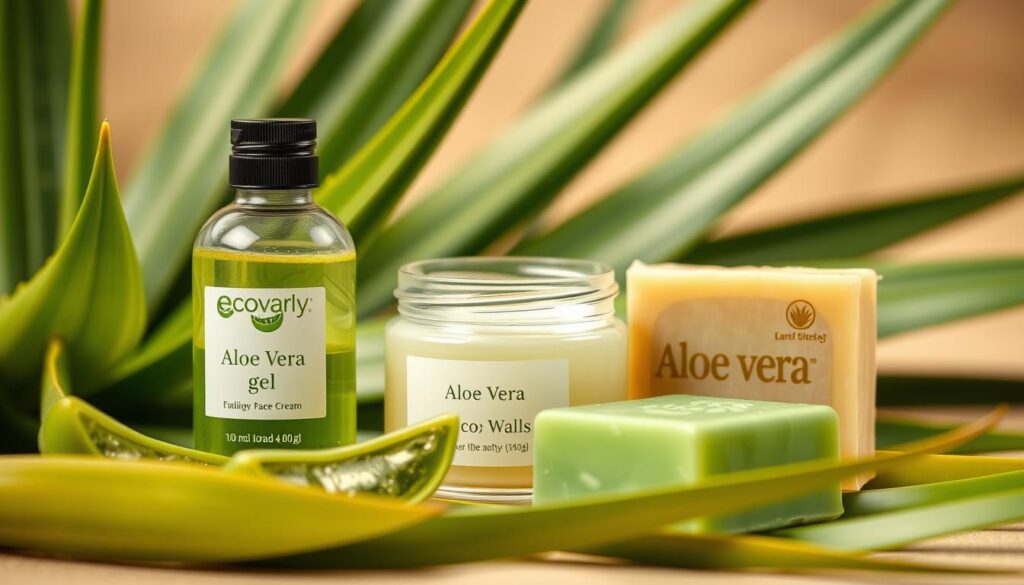
Zero-Waste Heroes in Aloe Skincare
Several brands are now pioneering zero-waste aloe skincare products, revolutionizing the way we approach beauty and sustainability. These products not only reduce waste but also promote the use of natural ingredients. By adopting minimal packaging or refill options, these brands are setting a new standard in the industry.
Some notable examples include:
- Aloe vera gel packaged in reusable containers
- Concentrated aloe vera serums that reduce packaging needs
- Bars made from aloe vera that eliminate the need for plastic bottles
Saying Goodbye to Plastic: Aloe-Based Alternatives
The shift away from plastic is a significant trend in eco-friendly beauty products. Aloe vera is being used to create innovative alternatives to traditional plastic-based products. For instance, aloe vera-based sheet masks are being developed as a more sustainable option compared to their plastic counterparts.
| Product | Traditional Material | Aloe-Based Alternative |
|---|---|---|
| Sheet Masks | Plastic | Aloe vera fibers |
| Moisturizers | Petroleum-based | Aloe vera gel |
| Exfoliants | Microbeads | Aloe vera and natural exfoliants |
Reusable Aloe Sheet Masks and Sustainable Packaging
Reusable aloe sheet masks are another exciting development in sustainable beauty. Made from materials like cotton or hemp infused with aloe vera, these masks can be washed and reused multiple times, significantly reducing waste. Additionally, brands are adopting sustainable packaging solutions, such as biodegradable materials and minimalist designs, to further minimize their environmental footprint.
By embracing these eco-friendly aloe beauty products, consumers can enjoy effective skincare while contributing to a more sustainable future.
DIY Green Beauty: Make Your Own Aloe Products
Discover the simplicity of making your own aloe vera products, a step towards a more sustainable beauty routine. By creating your own products at home, you’re not only reducing packaging waste but also harnessing the eco-friendly power of aloe vera in its most natural form.
Harvesting Your Own Aloe Gel Sustainably
To start making your own aloe vera products, you’ll first need to harvest the aloe gel. This process is straightforward and can be done sustainably by selecting mature aloe vera leaves from your plant. Cut the leaf near the base, and then slice off the serrated edges to expose the gel inside. Scoop out the gel with a spoon, taking care not to include the latex layer, which is the yellow sap just beneath the leaf’s skin.
It’s essential to be mindful of your aloe vera plant’s health. Only harvest what you need, and ensure the plant has enough leaves to continue photosynthesizing. This sustainable harvesting method allows your aloe vera plant to regenerate, providing you with a continuous supply of fresh gel.
Simple Recipe: Plastic-Free Aloe and Coconut Oil Moisturizer
Creating a moisturizer using aloe vera gel and coconut oil is a simple and effective way to enjoy the natural aloe vera benefits while avoiding plastic packaging. To make this moisturizer, you’ll need:
- 1/2 cup of freshly harvested aloe vera gel
- 1/4 cup of coconut oil
- A few drops of your preferred essential oil (optional)
Mix the aloe vera gel and coconut oil in a bowl until you get a smooth consistency. If desired, add a few drops of essential oil for fragrance. Store the mixture in a glass jar, and apply it to your skin as needed. This moisturizer is not only plastic-free but also rich in nutrients, making it an excellent alternative to commercial products.
Natural Hair Care Formulations Using Fresh Aloe
Aloe vera is also beneficial for hair care, offering conditioning and nourishing properties. To create a natural hair mask, mix aloe vera gel with other natural ingredients like honey and olive oil. Here’s a simple recipe:
- Mix 2 tablespoons of aloe vera gel with 1 tablespoon of honey and 1 tablespoon of olive oil.
- Apply the mixture to your hair, from roots to ends.
- Leave it on for 30 minutes before rinsing thoroughly with warm water.
This hair mask is a great example of a DIY aloe product that can be customized to your hair type by adjusting the ingredients. Regular use can lead to healthier, more vibrant hair, showcasing the versatility and benefits of using aloe vera in your beauty routine.
Aloe Beyond the Bathroom: Surprising Eco-Applications
The eco-friendly potential of aloe vera stretches into unexpected territories, revolutionizing how we think about sustainability. As we explore beyond its traditional uses, we uncover innovative applications that are transforming industries and contributing to a greener future.
Packaging Revolution: Aloe-Based Biodegradable Materials
Aloe vera is making a significant impact in the packaging industry with its biodegradable materials. Companies are now turning to aloe vera-based packaging as a sustainable alternative to traditional plastics. This shift not only reduces environmental waste but also provides a compostable solution that aligns with the growing demand for eco-friendly products.
Benefits of Aloe Vera-Based Packaging:
- Biodegradable and compostable
- Reduces reliance on non-renewable resources
- Lower carbon footprint in production
- Meets consumer demand for sustainable packaging
| Packaging Material | Biodegradability | Carbon Footprint |
|---|---|---|
| Aloe Vera-Based | High | Low |
| Traditional Plastic | Low | High |
| Recycled Paper | Medium | Medium |
Green Gardening with Aloe Vera
Aloe vera’s benefits extend into gardening, where it serves as a natural and sustainable tool for plant care. Its gel can be used to improve soil moisture retention, and the plant itself can act as a natural fertilizer when composted.
- Use aloe vera gel to enhance soil moisture
- Compost aloe vera leaves for natural fertilizer
- Plant aloe vera alongside other drought-resistant plants
Green Showdown: Aloe vs. Synthetic Ingredients
In the quest for sustainable beauty, understanding the environmental impact of aloe vera versus synthetic ingredients is crucial. As the beauty industry continues to evolve, the choice between natural and synthetic components is becoming increasingly significant.
Carbon Footprint Face-Off: Natural vs. Petroleum-Based
Aloe vera, being a plant-based ingredient, has a significantly lower carbon footprint compared to synthetic ingredients that are often derived from petroleum. The cultivation of aloe vera absorbs CO2, contributing to a reduction in greenhouse gases. In contrast, the production of synthetic ingredients involves processes that are energy-intensive and result in higher emissions.
Comparison of Carbon Footprint:
| Ingredient Type | Carbon Footprint (kg CO2/kg) |
|---|---|
| Aloe Vera | 0.5-1.5 |
| Synthetic Ingredients | 2.5-4.5 |
Water Wisdom: Comparing Resource Requirements
Aloe vera is known for its drought tolerance and requires minimal water for cultivation, making it a water-efficient crop. On the other hand, synthetic ingredients, depending on their production processes, may require significant amounts of water. This difference highlights the water-saving potential of choosing aloe vera-based products.
After Use: Environmental Impact When Products Wash Away
When beauty products are washed away, the environmental impact of their ingredients becomes a concern. Aloe vera, being biodegradable, breaks down naturally without harming aquatic life. In contrast, some synthetic ingredients can persist in the environment, potentially causing harm to ecosystems.
The comparison between aloe vera and synthetic ingredients underscores the eco-friendly advantages of choosing natural, sustainable beauty products. By opting for aloe vera-based products, consumers can contribute to reducing environmental impact while enjoying the benefits of nature-derived skincare.
Trust Symbols: Certifications for Genuine Eco-Aloe
In the world of aloe vera, certain symbols signify a product’s commitment to sustainability and eco-friendliness. As consumers become more environmentally conscious, the demand for products with credible eco-labels has surged. Certifications such as USDA Organic, EcoCert, and Fair Trade labels are becoming increasingly important in the aloe vera industry.
Understanding USDA Organic for Aloe Products
The USDA Organic label is a trusted certification that ensures aloe vera products meet rigorous organic standards. To qualify, products must be made from organic aloe vera plants grown without synthetic pesticides, herbicides, or fertilizers. This certification promotes sustainable farming practices and reduces environmental pollution.
Key benefits of USDA Organic certification include:
- Promotes sustainable agricultural practices
- Prohibits the use of genetically modified organisms (GMOs)
- Ensures products are free from synthetic pesticides and fertilizers
The EcoCert Standard: What It Means for Sustainability
EcoCert is another prominent certification that verifies the environmental sustainability of aloe vera products. It assesses the entire production process, from cultivation to packaging, ensuring that products meet high ecological standards. EcoCert promotes natural ingredients, sustainable production methods, and environmentally friendly packaging.
The EcoCert standard emphasizes:
- Environmentally friendly production processes
- Use of natural and organic ingredients
- Sustainable packaging solutions
Fair Trade Labels: Ensuring Ethical Aloe Sourcing
Fair Trade labels guarantee that aloe vera is sourced ethically, ensuring fair wages and working conditions for farmers and workers. This certification supports community development and promotes social justice in the aloe vera supply chain.
Fair Trade certification benefits include:
| Benefit | Description |
|---|---|
| Fair Wages | Ensures farmers and workers receive fair compensation |
| Community Development | Supports community projects and social initiatives |
| Safe Working Conditions | Promotes a safe and healthy work environment |
Growing Communities Through Sustainable Aloe
Communities are thriving thanks to the economic opportunities created by sustainable aloe vera. The cultivation of aloe vera has become a significant source of income for many rural areas, contributing to their overall development.
Economic Opportunities Blooming in Rural Areas
Sustainable aloe vera farming has opened up new avenues for economic growth in rural communities. By adopting eco-friendly farming practices, these communities not only contribute to environmental conservation but also benefit from the lucrative aloe vera market.
The economic benefits are multifaceted:
- Job creation in farming and processing
- Increased income for local farmers
- Stimulation of local economies through sustainable practices
Knowledge Sharing and Skill Building in Aloe Farming
A key aspect of sustainable aloe vera farming is the sharing of knowledge and skills. Training programs and workshops help local farmers adopt best practices, improving crop yields and product quality.
Key areas of focus include:
- Sustainable farming techniques
- Efficient water use
- Organic pest control methods
Case Study: A Community Transformed by Sustainable Aloe
A notable example of the positive impact of sustainable aloe vera farming is seen in a community in Mexico. Through the adoption of sustainable practices and fair-trade certifications, the community has experienced significant economic and social transformation.
The transformation included:
- Improved economic stability
- Enhanced community cohesion
- Increased environmental awareness
The success of this community serves as a model for other regions looking to benefit from sustainable aloe vera farming. By embracing eco-friendly practices and fair-trade principles, communities can thrive while contributing to a more sustainable future.
Conclusion: Embracing Aloe for a Greener Tomorrow
Embracing the eco-friendly power of aloe vera can significantly contribute to a more sustainable future. As we’ve explored, aloe vera’s sustainable beauty benefits extend far beyond its moisturizing properties, offering a holistic approach to green living.
By choosing aloe vera-based products and adopting sustainable practices, individuals can make a positive impact on the environment. From sustainable beauty routines to eco-friendly packaging, aloe vera is paving the way for a greener tomorrow.
The journey towards a more sustainable lifestyle is ongoing, and incorporating aloe vera into daily routines is a step in the right direction. As consumers, we have the power to drive change by supporting eco-friendly brands and practices that prioritize the health of our planet.
By embracing aloe vera and its numerous benefits, we can cultivate a more sustainable future, one that is rooted in the principles of green living and sustainable beauty.
FAQ
What makes aloe vera a sustainable ingredient in beauty products?
Aloe vera is a highly sustainable ingredient due to its ability to renew itself naturally, minimal processing requirements, and biodegradable nature, making it an ideal choice for eco-friendly beauty products.
How does aloe vera contribute to reducing environmental impact?
Aloe vera contributes to reducing environmental impact through its carbon sequestration capabilities, efficient land use, and water conservation techniques, making it a superior choice for sustainable beauty products.
What are the benefits of using organic aloe vera skincare products?
Organic aloe vera skincare products offer numerous benefits, including being free from harsh chemicals, promoting sustainable farming practices, and providing natural nourishment to the skin, aligning with the principles of eco-friendly beauty.
How can I ensure that the aloe vera products I buy are eco-friendly?
To ensure that aloe vera products are eco-friendly, look for certifications such as USDA Organic, EcoCert, and Fair Trade labels, which guarantee sustainable sourcing, minimal processing, and environmentally friendly packaging.
Can I grow my own aloe vera for personal use?
Yes, you can grow your own aloe vera for personal use, and harvesting aloe gel sustainably is a simple process that allows you to create your own natural skincare products while promoting a more environmentally friendly lifestyle.
What are some eco-friendly ways to use aloe vera beyond skincare?
Aloe vera has various eco-friendly applications beyond skincare, including biodegradable packaging materials, green gardening practices, and natural hair care formulations, showcasing its versatility and potential to contribute to a more sustainable lifestyle.
How does aloe vera compare to synthetic ingredients in terms of environmental impact?
Aloe vera has a significantly lower environmental impact compared to synthetic ingredients, with a lower carbon footprint, reduced water requirements, and biodegradable properties, making it a more sustainable choice for beauty products.
What is the role of fair-trade cooperatives in promoting sustainable aloe vera farming?
Fair-trade cooperatives play a crucial role in promoting sustainable aloe vera farming by ensuring fair prices, supporting local communities, and promoting environmentally friendly practices, ultimately contributing to a more equitable and sustainable aloe vera industry.
How can sustainable aloe vera farming positively impact local communities?
Sustainable aloe vera farming can positively impact local communities by creating economic opportunities, promoting knowledge sharing, and supporting skill building, ultimately transforming communities and contributing to a more sustainable future.
For world’s best Aloe Vera products Country Wise:
INDIA: CLICK HERE
USA: CLICK HERE
CANADA: CLICK HERE
AUSTRALIA: CLICK HERE
UNITED KINGDOM: CLICK HERE
